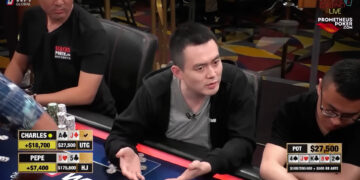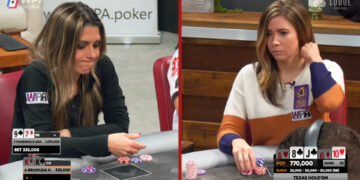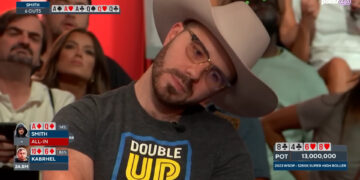Some say poker is a game of luck. Some say poker is a game of skill. Professional poker players and statisticians will agree that it’s 80% luck and 20% skill in the short run and 80% skill and 20% luck over the long haul. However, I’m a stubborn son of a bitch, and I always like to rebel against authority.
In this instance, I want to skew the numbers. Sure, people are going to read this and say, “Who the hell does this guy think he is? He can’t skew the numbers!” Before you take out your pitchforks, please allow me to explain.
The Poker Outlier
Like any other study, those numbers are based on a large sampling. If it’s a large sampling, then it’s going to be based on tons of average players. And in any study, there are going to be outliers. Let’s be the outlier.
What if we implemented a poker strategy for Texas Hold’em Poker that increased those numbers on the skill side, both short term and over the long haul? Would you like that? Well of course you would! And I’m about to tell you how to do it. It’s a different kind of poker strategy, but it’s also simple. And it fits into our poker rules for winning in Texas Hold’em Poker.
But I’m going to keep you in suspense a little first, and for a good reason. I want to make sure you’re in the right place. If you’re seeking Texas Hold’em Poker strategy where you can read charts, odds, and the exact right move in every situation, then you’re in the wrong place. I’m not saying those people are wrong. In fact, I think they’re right! If you want long-term steady results, go with them.
If you want to look at the game from a completely different angle, journey down a new path, and figure out ways to defeat your opponents on and off the felt for potentially serious financial rewards, then you’re in the right place.
I will lose many battles, but I have never once in my life lost the war. Ain’t gonna start now. I would die first. This goes much deeper, remembering every action and word from everyone you have ever met and using that information correctly as puzzle pieces. But that’s a story for another time. Let’s stick to the eyes for now, and how those eyes relate to poker strategy for tournaments.
The way to skew the odds (or percentages if we’re getting really technical) is to know the answer before everyone else. This isn’t fail-proof, but you can definitely use the eyes to your advantage. The eyes are the window to the soul. Poker is no exception. These are still human beings. Let’s take a look.
Pre-Flop Action

If you’re early to act, casually glance around the table and see how much interest people are paying to your action. If you have a garbage hand, do this anyway, but don’t give it away. The reason you’re doing this anyway is to get a sampling. I would highly recommend picking out one player at the table to focus on at first, which should be the chip leader or whoever you see as the most dangerous player at the table.
Watch their patterns. If you folded a garbage hand three times in a row from early position and that player barely watched you and then folded, note it. Now let’s say you’re in early position with ATo. That’s a strong hand, but not from early position. This is the type of situation where you want to casually use your peripheral vision to see if that threat is looking/not looking at you the same way. If the eyes, head angle, mannerisms are different from the other three times, be prepared to face a raise.
I can simplify this for you. If anyone who acts after you has a relaxed body and highly focused eyes that are watching what you’re doing, they’re preparing to raise pre-flop. If they’re sitting upright and/or they have ‘Normal Eyes’ (relaxed eyes), they are just watching the action and are more likely to limp or fold.
I know all of this sounds insane to some of you, but I’m simply reporting what I have seen. I have played way more live poker hands than the average person, and I have played those poker hands all over the place. What my brain has processed is now being transferred to paper (even though it’s not really paper) for you.
I’m basically turning my poker experiences into poker tips for my readers. These poker tips should help you become a better poker player for poker tournaments as well as traditional poker games, but primarily for poker tournaments since that’s what I focus on most.
Post-Flop Action
The following is one of the most effective moves on the planet. I use it all the time. I would prefer not to share it with you, but I have decided that I’m a writer before a poker player and must be loyal to my readers before being loyal to myself as a poker player. What you’re about to read is a Texas Hold’em Poker strategy that should absolutely be implemented.
Let’s say you’re in a marginal spot. Your opponent has just made a relatively large bet, or a large bet, and you’re really not sure if you have the winner. You’re going through all the possibilities in your mind. You’re analyzing the hand in rewind and seeing if the story makes sense. All of this is important, but there is something else you can do. And it’s something that definitely fits into our poker rules for winning.
When you’re unsure and tanking, move your hand to your chip stack as if you’re going to call. When your hand is touching your chips, look up at the villain. If his eyes are highly focused on your actions (including your chips), he wants you to call.
Making a bet

The reason for this is simple, and it once again relates to human behavior. The villain is anticipating accumulating those chips. He’s visualizing his future when looking at your chips. However … if you have been reading these articles, then little does that son of a bitch know that we know what he’s thinking. We’re going to fold here.
This concept also applies to their chips. If a poker player looks at their own chips prior to action being on them (pre-flop or post-flop), it means they’re ready for battle. They are gearing up to put those chips to work because they like their hole cards. It doesn’t mean they have a monster, but they have at least a relatively strong hand. They are once again giving away their future actions with their eyes.
Here’s the best part. Let’s say there is a player to your left who always looks at his chips prior to acting when he wants to put them to work. You know he’s going to call or raise due to this pattern. NEVER say anything about this to him. Now let’s say you’re in the small blind and he’s in the big blind when it’s late in a tournament and the blinds are high. You look down at 73s, which is a crap hand, but he didn’t look at his chips this time. Well, there’s your answer. Raise the fucker.
These extra spots where you win pots when you’re not supposed to can often mean the difference between 1st Place and a min-cash. These are spots where most people aren’t winning pots. You need to get ahead of the competition. By having extra information, you’re going to be able to accumulate more chips. By the way, this isn’t just poker strategy for tournaments; it can also be applied to traditional poker games.
A Quick Story
I recently sat at the same table with a good player. I’m not going to reveal this player. I never do that. I also don’t really know how good this player is because I have only played with him a few times and it has always been brief. But I do know that he has delivered quality results in poker tournaments.
I had a situation where we were heads-up. I was a little surprised when he called my pre-flop raise when there were no other callers. If he was going to play me heads-up, then I would assumed a player like him would raise pre-flop to really see where he stood. However, players like him and myself think a little differently. It’s psychological warfare.
Looking back on it, he wasn’t calling to win the hand, although that would be a bonus. He was calling for information. He wanted to see what I raised with and how I would play it. He needed that information for the future. This was a smaller event, and he knew there would come a time in a bigger event where he needed to know what I was doing. Ironically, I was doing the same thing.
I had raised 3x BB pre-flop UTG +1 with KTs. That isn’t a standard play for me, but it was based on the way the table was playing. A few stronger players that had been to my left had recently busted and were replaced by very standard players that just played their cards. I knew my raise would either get all the way through or it would be two opponents maximum. It turned out to be heads-up.
I bet out on the flop to take down a decent-sized pot (blinds were high) despite having whiffed the flop. I looked down like I usually do, but it was taking a while. Usually when I look up in these situations, I find the other player looking at the board, thinking to himself, or something along those lines. In this situation, I looked up and found the villain staring me dead in the eyes.
To the novice, it would appear as though the villain was winning the battle because he had the confidence to stare me down, but that is far from the truth. When someone stares me down like that, it already tells me the rest of the story.
When someone stares you down, it usually means weakness. Most good players understand that. But what they don’t realize is that if someone stares you down like that AND raises, it means they were using the stare-down to trick you into thinking that they were weak because they saw you as a good player, knew you would think the stare-down was weakness, and now they’re trying to trick you. But we got ’em. Don’t sweat it.
When someone stares you down, they trap themselves. Either you bet and they fold because they’re weak (most of the time) or you bet and they raise because they want you to think they’re weak, but it’s an easy fold for us.
Of course, we also have the all-in stare-down thing going on. In most cases, this is a call, but not always. The best way to determine a call or fold is based on the type of player who put you all-in. If it’s a home-gamer, tourist, fish, etc., they don’t know that you know what you know. In other words, they think the stare-down is going to intimidate you. I almost always call (and win) in these situations. On the other hand, if it’s a good player, they are doing this in an attempt to trick you. It’s a fold.
Getting back to that hand vs. the good player where I bet on the flop and he was staring me down. When I saw him staring me in the eyes (awkward), I purposely looked to the right and over the dealer’s head. It was a casual look, as if I didn’t want to appear too serious because I wanted a call. Little did he know it was a bluff. He folded and we moved on. Perhaps I should have showed that bluff (not something I do) because he later busted me. Hey, it happens.
Another Level
If you really want to take things to another level, strike up a casual and brief conversation with one of the players at your table at the dinner break. Don’t stare into their eyes (that’s weird), but be sure to get a few good looks into their eyes while talking. Be sure to strike up a conversation about something good. If their eyes light up and they agree with you, they are much more likely to be trusted on the poker table.
Not only that, you just disarmed them to a degree. Whether they realize it or not, they will be sending helpful cues in your direction after the dinner break. It could be with words, body language, or eyes.
If you bring up something good (intentionally) and this person begins complaining, they are less likely to be trusted at the poker table. The poker table is really a reflection of someone’s personality. Are they straightforward? Nice? Friendly? A bad actor? Deceptive? A Snake? Aggressive? Confusing? Have you ever realized that the way a person is in real life almost always matches how they play poker? Sports, and games, don’t build character, they reveal it.
I don’t know if that’s a good or bad thing for me. Good Heart/Evil Mind. If you strike up a conversation with me during the dinner break and bring up something good, my eyes will genuinely light up and I will enjoy the conversation (not for too long, please), but I will then use that to my advantage and switch gears once I sit back down.
Final Thoughts
The eyes will give you the answers. See where their eyes go, watch what their eyes are saying, and use your eyes to send false signals. Now you’re a deceptive son of a bitch. Win or lose, they’re never going to figure you out. See you at the WSOP!
♠ pokerjournal.org


















Discussion about this post